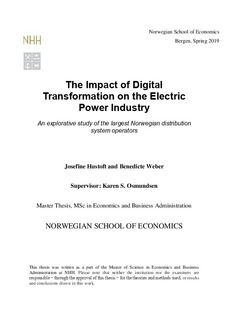The impact of digital transformation on the electric power industry : an explorative study of the largest Norwegian distribution system operators
Master thesis
Permanent lenke
http://hdl.handle.net/11250/2612210Utgivelsesdato
2019Metadata
Vis full innførselSamlinger
- Master Thesis [4372]
Sammendrag
The Norwegian electric power industry is currently facing major changes in terms of how business is conducted. New technology, increased competition and regulatory changes are just some of the drivers for the ongoing digital transformation of the industry. There is limited theory available on how to successfully handle a digital transformation, so the goal of this master thesis is therefore to understand how the Norwegian distribution system operators (DSO) meet and manage the current digital transformation.
This thesis addresses three areas that can help increase our understanding. First, we examine the actions and challenges the DSOs have encountered and reflect on their digital maturity. Second, we investigate how the DSOs organize their IT department and how they manage innovation and digitalization. Third, we examine how they handle leadership in this digital age with focus on the relatively new Chief Digital Officer (CDO) role. The data for our analysis were collected using semi-structured interviews with representatives from seven of the largest DSOs in Norway.
Our main finding is that the DSOs, as per today, have made well-founded plans for how to manage a digital transformation, and identified and initiated relevant actions. They agree about new technology, increased competition, regulatory changes and increased efficiency being drivers for the digital transformation, and they are concerned about the same challenges in regard to integration of new technology and systems, and how to change the culture in the organization. However, we discovered that all of them manage the transformation in different ways. All DSOs have restructured their IT department the last couple of years and we found three different approaches. Four of the DSOs have included innovation and digitalization in the IT department and two have separated it from the IT department. The last DSO have a separated innovation department, but no IT department. In addition, to get control and ensure digital development three of the DSOs have a CDO, three have a CDO in the parent company and only one has chosen not to establish this role.
One can argue for and against the different approaches, but we cannot justify to draw an indisputable conclusion on what is right and what is wrong. Which approach a DSO should choose will depend on company specific factors such as the size of the company, its organization and its corporate culture, but also on external factors such as new competitors, new technology and customer needs.
